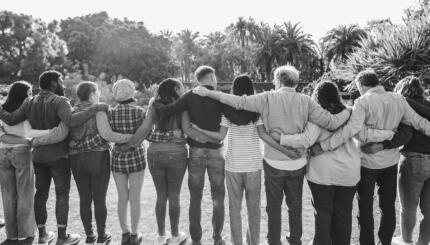One challenge of using a fixed liturgy in prayer is integrating the personal expression of the heart and soul. Elohai Netzor, the additional paragraph said at the conclusion of the Amidah, is an opportunity to do just that. Reciting this prayer is an opportunity to stand for a moment longer in the space of the Amidah, to internalize its words and concepts, and to set a mindful and loving intention for yourself.
Although the official structure of the Amidah concludes with Sim Shalom, the prayer for peace, the rabbis of antiquity added various personal meditations. The version that appears in most prayer books as Elohai Netzor comes from Mar bar Ravina, a 4th century sage whose personal formulation is recorded in the Talmud. Berakhot 17a
The prayer begins:
My God, guard my tongue from evil
And my lips from [speaking] deceit
And [to] those that curse me, let my soul be silent
And let my soul be like the dust to all.
Open my heart to Your Torah and to Your mitzvot (commandments)
The language of Elohai Netzor shifts from the communal language — we, our, us — of the Amidah to the individual. In place of the Amidah’s grand opening invoking “our God and God of our ancestors,” this prayer opens with a statement of one’s personal relationship with Elohai — “my God.” The Amidah focuses on praise, petition and thanks. Elohai Netzor then invites us to take a personal step inward, and as such feels like a crescendo, as if all the words that have come before have primed us for this grand finale, this invitation to experience a more personal, elevated instance of raw vulnerability and openness.
Prayer is intended to be a reflective act. We look inward in order to affect our outward behavior. And Elohai Netzor invites us to explore and be present to what is happening inside. This opportunity to name and deepen our awareness sets the tone for a heightened sense of our actions throughout the day.
Unlike so much of the prayer liturgy, Elohai Netzor speaks directly to each of us, reminding us to be mindful of how we speak and act. These concepts are accessible, relevant, and make up the very basic building blocks of how we show up in the world.
Let’s explore some of the verses in the prayer:
Guard my tongue from evil and my lips from speaking deceit: This verse asks for the strength to resist temptation and not let our tempers get the best of us. It reminds us to watch how we speak, the way we treat those we love, and how we treat ourselves.
Open my heart to your commandments: Elohai Netzor is the seal on our daily contract with God. But even if you don’t believe in God, this is a tangible reminder to keep our hearts open, to cultivate awareness of our thoughts and feelings and the way they manifest in our bodies. The heart, the mind, the tongue — our entire holistic being is represented in this one paragraph.
A fixed liturgy is of course absolutely necessary in prayer. Sometimes we just don’t have the words and have to lean on what our tradition offers. And it’s vital for Jewish community that we have a collective language that enables us to pray in unison.
But Elohai Netzor is one place within the liturgy where we can let some of that fall to the side, to look inward and make mindful intentions for the day. Elohai Netzor is the gift of spaciousness within the often structured world of prayer. Like the cool down after the prayer work out, it invites us to sit and breathe, to meditate quietly and to just be. And that’s true whether your prayer is in relationship to the Divine or your prayer creates a space for a personal reminder to watch yourself.
And it doesn’t have to be the exact words on the page. The words of Elohai Netzor are powerful, but they’re only one possibility. The Talmud records several meditations that different rabbis said at the close of their prayers. Elohai Netzor is the one that caught on, but it needn’t limit you. This is the perfect time to either explore the meditations of your heart and soul or to use the words on the page as a gateway into whatever is in your heart.
Over the years I have developed an almost subconscious choreography when I encounter the introspective space of Elohai Netzor that enables me to settle in to a spiritual state more easily. I stand, with eyes closed, arms by my side, palms open facing outward, before the Divine. With every ounce of my being, I try to internalize the words and concepts I am reciting and add my own personal prayers and meditations, drawing from where I am and what I need in that moment so I can set a mindful and loving intention for myself.
Carving out a space within our daily prayers for a reflective experience, where we stand open before our creator, reminded of our own humanity and our strength in vulnerability, can inspire us with renewed perspective as we set a daily intention for living a mindful and purposeful life.
Click here for the full text of Elohai Netzor.



